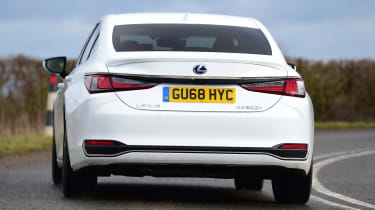Lexus ES review - MPG, CO2 and running costs
Impressive fuel consumption and low emissions mean the ES hybrid makes sense for business and private owners alike

Depending on the trim and which alloy wheels are fitted, the ES is capable of between 50.4mpg and 54.3mpg under WLTP testing protocols, giving it a theoretical range of almost 600 miles on a single tank of fuel. Emissions are rated at 119g/km to 128g/km, again under WLTP standards – which means Benefit-in-Kind rates are between 26 and 28 per cent for company car drivers.
That makes it an appealing prospect, as it manages to compete with diesel rivals, but using petrol power. Similarly, compared to non-RDE2 compliant diesels (which face an additional company car Benefit-in-Kind levy of 4 per cent) the Lexus certainly has an allure for business drivers.
Road tax rates for the ES are competitive, although the price tag can affect this significantly. All models cost £175 in tax for year one and £150 thereafter. ES’ which cost more than £40,000 new (which includes F Sport versions with a Takumi Pack and Takumi models) are levied at an additional £325 per year for five years starting from the second time they are taxed. Importantly, more affordable models can be pushed over the £40,000 mark if enough optional equipment is added.
Electric range, battery life and charge time
Lexus doesn’t quote an official range for the ES when operating on electric power alone, because the system is set up to use the best combination of electric and petrol power for the driving conditions. Also, the battery pack is much smaller than most plug-in hybrids so its range would seem rather small.
Despite this, when driving around town the ES has the potential to travel on battery power most of the time, with the petrol engine only engaging when faster acceleration is needed. Like other Lexus hybrids, you can change the vehicle mode to save the battery for later in your journey and keep it fully charged. As the ES is what Lexus terms a ‘self-charging’ hybrid, power is returned to the battery by a combination of regeneration and engine power, so there is no need to plug it in.
Insurance groups
Insurance groups for the Lexus ES vary from 33 to 38 depending on specification. This range is broadly in line with rivals, although the lack of performance version means the highest group model is lower than equivalents from Audi and BMW.
Depreciation
The previous Lexus GS model retained between 37% and 44% of its value after three years, but the ES is expected to be slightly better, with a retained value of 41-46%. In comparison, the BMW 5 Series, Mercedes E-Class and Audi A6 are a couple of percentage points ahead of the ES – demonstrating that the German marques are still the popular ones in the sector.









